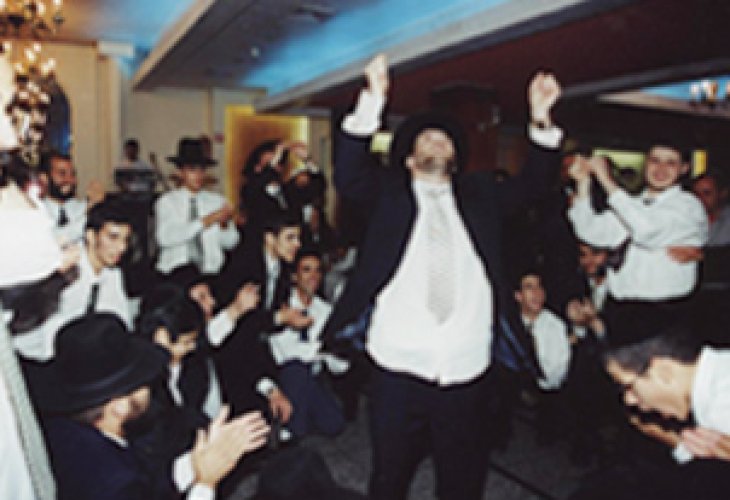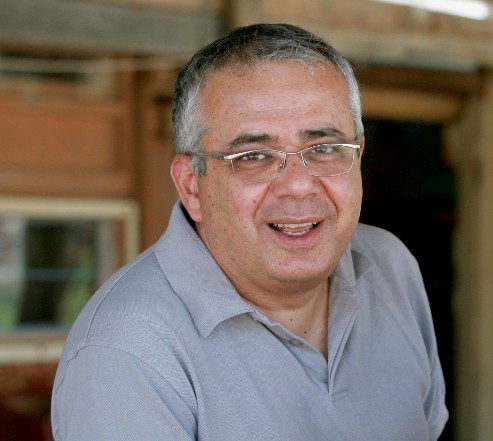Journalist Amnon Levy: "The Public is Driven by Incitement Against the Ultra-Orthodox"
For the past 31 years, he's been exploring the ultra-Orthodox community, believing the secular public doesn't truly know them. Why does he admire them, and how does he view them not as parasites? A fascinating interview with journalist Amnon Levy, who stands by the ultra-Orthodox in Channel 10's new campaign.

Senior journalists from "Channel 10" are recently featured in a new campaign, expressing their opinions on various topics within Israeli society. The promo, which stirred reactions among different sectors, features journalist Amnon Levy, the creator of the show "True Faces".
Levy, a veteran journalist, has a rich background concerning the world of the ultra-Orthodox from all spectrums. The campaign video starts with the most popular expressions against them: "Black, parasites, thieves, spongers who just want to take our money".
While he seems to call on his peers to acknowledge the truth that they are used to fearing the ultra-Orthodox, I think to myself about another truth: It's rather pleasant to call a secular journalist and hear from him that he doesn’t think the ultra-Orthodox are spongers, and he does indeed answer my call.
"Can I take a few minutes of your time?" I politely ask after introducing myself. He doesn't seem to hesitate, only curious, clarifying that he's traveling with people, "so whatever we can". And in my view, whatever little we manage is worth a lot. Another point of light amid all the outside confusion.
What makes a prominent secular journalist, an "atheist" by his own definition, spend 30 years in the stronghold of the ultra-Orthodox street? I can't help but wonder.
"31, to be precise," he corrects me with humor.
"I'm secular, from Rishon LeZion, and before living in Jerusalem, I had never seen an ultra-Orthodox person. I grew up in a secular environment. There were religious people, my grandfather was a religious man, but not ultra-Orthodox. For example, a shtreimel I didn’t see. But I can say that I was always fascinated to get to know and understand. When I came to Jerusalem, even before becoming a reporter, I knew that Mea She'arim and the ultra-Orthodox neighborhoods interested me a lot. So I went there. When I became a reporter, I started at the Ministry of Religions. Religions weren't that interesting to me, but religious people were. So I went to Mea She'arim, stood on the street, and started talking to people and discovered a world".
 Amnon Levy (Photo: Flash 90)
Amnon Levy (Photo: Flash 90)"Political Gain at the Expense of the Ultra-Orthodox - It’s Infuriating"
"People travel to learn about cultures in countries very far from them because it interests them. Here, we have a society right next to us, intriguingly close, unique, challenging in every respect, intelligent, anthropological, and when it comes to offering a different lifestyle, it’s very interesting".
Levy thinks that during the 31 years he's delved into ultra-Orthodox society, many things have changed, "both in secular society and in ultra-Orthodox society", he clarifies. "Life is dynamic, but a lot of hostility and terrible, unjustified, and unfounded hatred remains on both sides". Levy is automatically more interested in the secular side, "because I'm part of this society, and it really annoys me. I've seen over the years how people made electoral capital during elections time and time again. Tommy Lapid, Yair Lapid, political capital from hating the ultra-Orthodox, and I don't think it's justified".
Levy believes most ultra-Orthodox truly can't enlist due to their lifestyle, and is certain they should be accepted with their beliefs, mitigating the obstacles preventing their enlistment. "I fundamentally think that the entire association with Israeli identity can't solely be through the army. What, the disabled can't serve in the army, so they're not Israelis? So we incite against them"?
Not that it’s the comparison, but the idea conveys the message.
Levy thinks society must be more liberal in recognizing that not everyone can serve in the army, and that Israeli identity does not depend solely on it. "I can contribute to the nation and be creative even without being in the army". And this comes from Levy, who served in the army, as did his wife, his son, and now his youngest son about to enlist.
"I Don't See the Ultra-Orthodox as Parasites"
"There are many myths," says Levy. "I know the vast majority of ultra-Orthodox women work. Even according to official CBS data, indicating only 40% of men work, most of the ultra-Orthodox community works, so there's no room for declaring these unnecessary and incorrect words, that they are parasites. Secular people don’t know much about the ultra-Orthodox, and what they do know is distorted. They experience a system of incitement and brainwashing. In every election, there's this campaign. Avraham Burg and Ehud Barak were also those who made their careers at the expense of issues related to the ultra-Orthodox, and the public grows up with these things and that’s what they learn and know. I'm much more concerned about true tax payment than enlistment, for example, because everyone should pay taxes, but many ultra-Orthodox can't because they can't legally work. They can't legally work because of the army; it’s all a chain that doesn’t really favor them".
Don’t they see you as an "odd bird" who loves the ultra-Orthodox in your environment?
"It's clear to me that my video is the most controversial. But what does it mean? Should I be like everyone else and say what everyone else says? When I made a prime-time movie about Rabbi Ovadia Yosef, back then, and said things that no one else did, and praised him for his skills and the nature of his rulings and social leadership, I was written about in Haaretz as someone who flatters the ultra-Orthodox, that I brown-nose Rabbi Ovadia Yosef. Time after time, they wrote about me in various places as someone who curries favor with the ultra-Orthodox. So what? Most of my career has been controversial, and that's perfectly okay. A journalist who isn’t controversial should find another profession".
Levy truly loves Mea She'arim. He was stunned when he received terrible reactions to a promo for a show with Yoelish Kraus, a central figure in the ultra-Orthodox community. Malicious comments sent him to Iran. After the program, he received amazing and astonished responses. People couldn’t believe the simplicity, modesty, the charm with which things were said. Suddenly they had a different picture. "Just last Friday, I took a journalist friend and a well-known singer, and we went to visit Mea She'arim. They came out astonished and even excited," says Levy. "I think if you look at the ultra-Orthodox as an interesting public and not through the rifle's scope, you can gain a lot from it".
Is there room for change, I ask towards the end, and will we succeed? "Everyone will do their part," Levy says. "I’m a big believer in change, and I think we now have an opportune moment. After the last elections, during whose campaign Yair Lapid incited terribly, and the entire essence of his party was against recruiting boys and more, this time I don't see it as a central issue, and I'm very happy about it.

